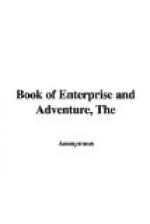At the first shock, no token, in heaven or on earth, had excited attention; but at the sudden movement, and at the aspect of destruction, an overwhelming terror seized on the general mind, insomuch, that the instinct of self-preservation was suspended, and men remained thunderstricken and immoveable. On the return of reason, the first sentiment was a sort of joy at the partial escape; but they soon gave place to grief for the loss of family, and the overthrow of the domestic habitation. Amidst so many aspects of death, and the apprehension even of approaching judgment, the suspicion that friends were yet alive under the ruins was the most excruciating affliction, since the impossibility of assisting them rendered their death—(miserable and terrible consolation)—a matter of preference and of hope. Fathers and husbands were seen wandering amidst the ruins that covered the objects of their affections, and, wanting the power to move the superincumbent masses, were calling in vain for the assistance of the bystanders; or haply they lay groaning, night and day, in their despair, upon the ruinous fragments. But the most horrid fate—(a fate too dreadful to conceive or to relate)—was theirs, who, buried alive beneath the fallen edifices, awaited, with an anxious and doubtful hope, the chances of relief—accusing, at first, the slowness, and then the avarice, of their dearest relations and friends; and when they sank under hunger and grief—with their senses and memory beginning to fail them—their last sentiment was that of indignation against their kindred, and hatred of humanity. Many were disinterred alive by their friends, and some by the earthquake itself; which, overthrowing the very ruins it had made, restored them to light. It was ultimately found, that about a fourth of those whose bodies were recovered, might have been saved, had timely assistance been at hand. The men were chiefly found in attitudes indicating an effort at escape, the women with their hands covering their face, or desperately plunged in their hair. Mothers were discovered dead who had striven to protect their infants with their own bodies, or lay with their arms stretched towards these objects of affection, when separated from them by intervening masses of ruin.




